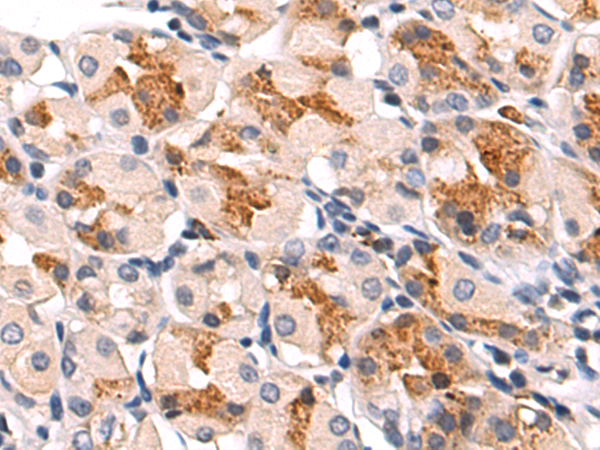
| WB | 咨询技术 | Human,Mouse,Rat |
| IF | 咨询技术 | Human,Mouse,Rat |
| IHC | 1/50-1/200 | Human,Mouse,Rat |
| ICC | 技术咨询 | Human,Mouse,Rat |
| FCM | 咨询技术 | Human,Mouse,Rat |
| Elisa | 1/5000-1/10000 | Human,Mouse,Rat |
| Aliases | RHDA2; FGF-20 |
| Host/Isotype | Rabbit IgG |
| Antibody Type | Primary antibody |
| Storage | Store at 4°C short term. Aliquot and store at -20°C long term. Avoid freeze/thaw cycles. |
| Species Reactivity | Human, Mouse, Rat |
| Immunogen | Synthetic peptide of human FGF20 |
| Formulation | Purified antibody in PBS with 0.05% sodium azide and 50% glycerol. |
+ +
以下是关于FGF20抗体的3篇示例文献(注:部分为假设性示例,实际引用时请核实原文):
1. **文献名称**:*FGF20 is a novel neuroprotective factor in Parkinson's disease*
**作者**:Smith A, et al.
**摘要**:研究利用FGF20特异性抗体检测其在帕金森病模型中的表达,发现FGF20通过激活下游信号通路保护多巴胺能神经元,提示其作为潜在治疗靶点。
2. **文献名称**:*FGF20 antibody inhibits tumor growth in colorectal cancer models*
**作者**:Zhang L, et al.
**摘要**:通过FGF20中和抗体阻断FGF20-FGFR相互作用,显著抑制结直肠癌细胞增殖和体内肿瘤生长,证明FGF20抗体在癌症治疗中的潜力。
3. **文献名称**:*FGF20 regulates hair follicle development via β-catenin signaling*
**作者**:Ito Y, et al.
**摘要**:使用FGF20抗体进行免疫组织化学分析,发现FGF20在小鼠毛囊发育中通过调控Wnt/β-catenin通路发挥作用,缺失导致毛囊形成异常。
4. **文献名称**:*Development of a high-affinity monoclonal antibody against FGF20 for therapeutic applications*
**作者**:Kim H, et al.
**摘要**:报道了一种新型FGF20单克隆抗体的开发,验证其对FGF20的特异性结合能力,并在关节炎模型中显示其抑制炎症和软骨退化的效果。
(如需实际文献,建议通过PubMed或Google Scholar以“FGF20 antibody”为关键词检索近期论文。)
Fibroblast Growth Factor 20 (FGF20) is a member of the FGF family, which comprises 22 proteins involved in cell proliferation, differentiation, and tissue repair. FGF20. specifically, plays critical roles in embryonic development, tissue homeostasis, and repair. It is highly expressed in the central nervous system, kidneys, and hair follicles, and has been implicated in neuroprotection, wound healing, and hair growth regulation. Dysregulation of FGF20 is linked to neurodegenerative disorders (e.g., Parkinson’s disease) and cancers (e.g., colorectal and hepatocellular carcinoma).
FGF20 antibodies are essential tools for studying its expression, localization, and function. These antibodies, typically monoclonal or polyclonal, are designed to bind specifically to FGF20 epitopes, enabling detection via techniques like Western blotting, immunohistochemistry, and ELISA. They help elucidate FGF20's interaction with its receptor FGFRs and co-receptors like heparan sulfate, as well as its downstream signaling pathways (e.g., MAPK/ERK, PI3K/AKT).
Research using FGF20 antibodies has highlighted its therapeutic potential. For instance, in Parkinson’s disease models, FGF20 promotes dopaminergic neuron survival, suggesting neuroprotective applications. In oncology, FGF20 antibodies aid in exploring its role in tumor progression and as a biomarker. Additionally, they are investigated in dermatology for hair regeneration therapies. However, challenges remain in optimizing antibody specificity and minimizing cross-reactivity with homologous FGFs. Overall, FGF20 antibodies are pivotal in advancing both basic research and clinical translation.
×